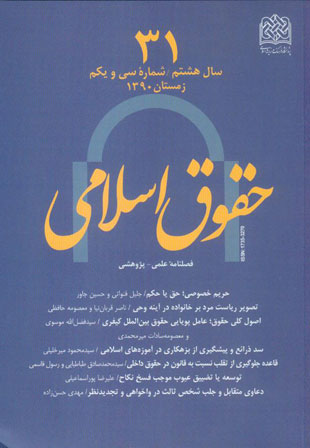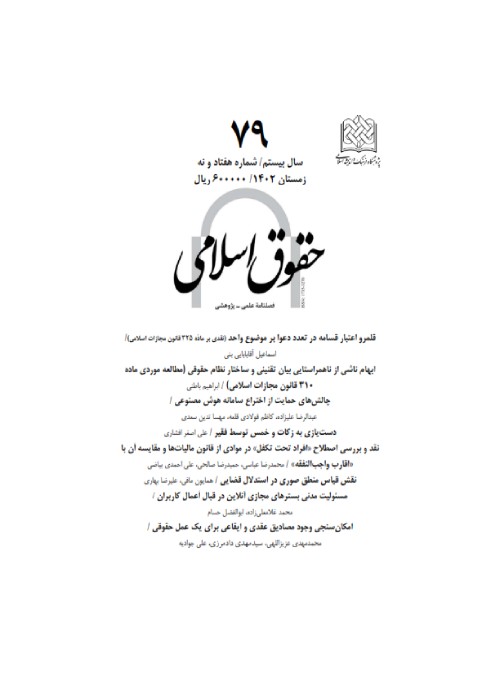فهرست مطالب

فصلنامه حقوق اسلامی
سال هشتم شماره 4 (پیاپی 31، زمستان 1390)
- 222 صفحه، بهای روی جلد: 40,000ريال
- تاریخ انتشار: 1390/11/18
- تعداد عناوین: 7
-
-
صفحه 7
-
صفحه 157
-
Page 7Opponents of protection of privacy are so interested in acquiring, processing, and even commercializing individual data. This act, even if it is accompanied upon permission of the individual, will endanger personality and individual and social security of the person and his privacy. Thus, one of the main questions in the field of privacy concerns the extent of person's rights and the extent their wills may influence privacy and possibility of assigning or relinquishing it in relations between individuals. The reply depends on whether privacy is a "right" or an "award". If it is an award, then a person cannot compositionally intervene in assigning or relinquishing it; though it seems possible by applying creative will. The aspects of the privacy related to human dignity, personality and spiritual prestige of the person being subject to privacy, are assumed as "awards" but aspects not related to the above which if disclosed will not harm person's spiritual prestige are "rights" and may be considered as property and assigned or relinquished if necessary.Keywords: privacy, spiritual prestige, data, right, award, assignment, relinquishment
-
Page 33If the revelatory verses are reflected upon, it will be understood that the reasonable idea of managing the family by man never means domination and oppression; for, the mutual relations between two spouses in the Holy Quran are against all kinds of oppression, and such relations are never aimed to consider spouses as two claimants against each other trying to gain their rights. But rather, moral teachings such as conventional treatment (muashirah maruf), forgiveness, harmony, selfsacrifice and the like are at the center of this culture. Thus, in such a modern culture, the notion of husband's custody of his wife is such amanagement that is, to continue and develop family system and bring spouses to peace, necessary and even satisfactory and reasonable. Under such morality-centered circumstances, the effects of man's management and woman's being managed are of a moral kind and all decisions and rules will become consistent with virtues. In sum, paying attention to spouse's demand will prevent all misconducts and misuses and adorn spouses privacy with lofty morality-centered models.Keywords: the Holy Quran, husband's management, spouses, culture, morality, centered
-
Page 63As international Law developed, the sources of international law showed their efficiency. According to the clauses 1 and 2 of the Article 138 of the statute of the International Court of Justice, the main sources of the international law are customs and treaties which cover, to a great extent, the traditional public international law. For this reason, courts were mainly in charge of interpreting contractual rules and explain conventional rules. Thus, the minor source of international law which might be referred to if there was no rule in the main sources, was not of so use. Upon emergence of new branches such as international penal law in international law which use the same sources of the international law and because of the fact that there are many ambiguities in this field, the minor source assumes an important role. In the present writing it is assumed that this source of the international penal law, in spite of its being a minor one, plays an important role in the practice of international penal courts and as a result in establishment of penal justice.Keywords: general principles of Law, international penal law, Court of Ex, Yugoslavia, Ruanda Court, the practice of comparative law
-
Page 95One of the most important ways to struggle against crimes is controlling causes and means of crime. In the Islamic teachings, procurement of instruments of crime, abettance, jobs which lead to unlawful things or crimes and the like are unlawful and this is among measures taken to prevent crimes. [In the present article] the rule of blocking the means, necessity of that which leads to a necessary and prohibition of that which leads to unlawful are studied in terms of preventing crimes. While discussing various views of the Muslim jurists, the present writing emphasize that in the jurisprudence of all Islamic schools, necessity of opposition to causes and grounds of crimes has been emphasized; but this is, in each school, based on a different foundation. Finally, it should be noted that in order to avoid extreme criminalization and useless expansion of the list of crimes, we do not seek to consider all or most causes and grounds of crimes as being crime; but, based on the emphasis the Islamic teachings put on necessity of controlling such cases, it is recommended that necessary attempts be made to consider certain cases as being crimes and to make uses of non-criminal mechanisms in other cases.Keywords: crime, blocking the means, obligatory preliminary, unlawful preliminary, prevention, causes of crime
-
Page 127Though, in the International Law, fraud against law has been spoken of, fraud against law occurs in the scope of domestic law as well. Fraud against law in the domestic law is employment of correct and legal means to attain illegal goals and consequences. Theory of orientation, theory of abuse of rights and theory of good will are legal foundations of [the theory of] fraud against law. Sanctions for frauds against law are different in domestic and international law. In the domestic law, he who commits fraud wants to harm others; thus, a sanction protecting the rights of the victim will be sufficient and fraud against law, if some conditions are observed, will make the transaction null and void. The present writing tries to explain the rule of preventing fraud against law in domestic law and its sanction, and criticizes arguments posed by the opponents of the above rule. Finally, the present writing analyzes the legal status of contracts concluded on the basis of fraud against law.Keywords: fraud against law, religious device, good will, orientation of transaction, abuse of rights, trickery contracts, formal transactions
-
Page 157Because of the outbreak of diseases such as AIDS which are followed, as compared by defects causing cancellation of marriage such as insanity, by serious losses, some questions arise: May suffering contagious and fatal diseases such as AIDS and hepatitis be considered as one of the defects causing cancellation of marriage? And may the spouses be allowed to cancel the contract of marriage because of such a defect or have we, as is well-known in jurisprudence, to limit defects causing cancellation to some particular ones among which are not AIDS and the like? And is the wife who cannot benefit the right of divorce forced to live all her life with a sick man? Or, proving distress and constriction or harm, may she apply for divorce? (To apply for divorce takes, of course, long time). Referring to the previous studies, the present writing makes clear that the argument for limitation of defects causing cancellation of marriage may be criticized; and in addition to the rules of no harm and no distress (which have been referred to in the previous studies), other arguments may be appealed to according to which defect causing cancellation of marriage are not restricted to those mentioned in the texts.Keywords: marriage, defect, AIDS, no harm, no distress
-
Page 189Because of some defects in the Civil Code of Procedure concerning counter claims and impleader in protest and revision, there are some questions and ambiguities which should be necessarily discussed. Civil Code of Procedure keeps silent about counter claim in protest and revision and confirms some pieces of evidence for which the legislator has not issued such a permission. Claim for impleader in protest and revision has been clearly accepted by the Civil Code of Procedure; concerning the time limit and the way that the petition should be submitted there are some ambiguities which should be studied. The present writing tries to study ambiguities and points which should be discussed concerning counter claims and impleader in protest and revision and then provides some solutions.Keywords: counter claim, claim of impleader, protest, revision


